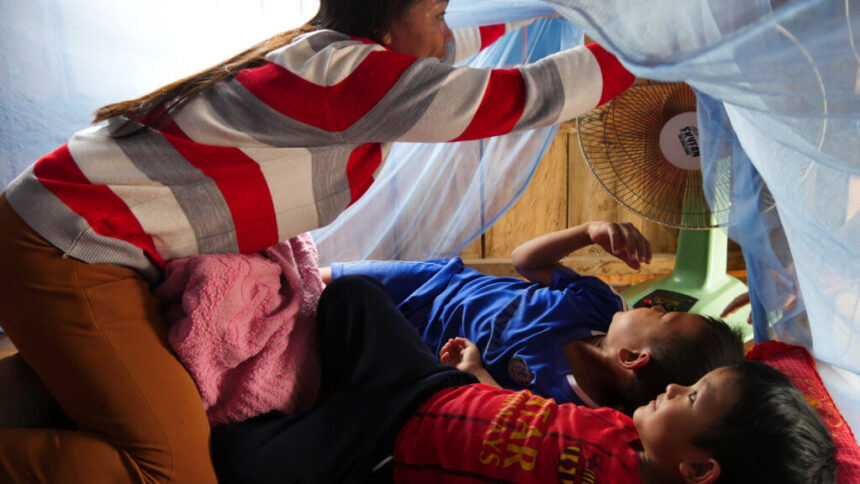The Trump administration’s decision to permit the resumption of various global health initiatives, despite the ongoing foreign aid freeze, has brought hope to programs targeting diseases like malaria and tuberculosis. In a memo dated Tuesday and obtained by STAT, a USAID official announced that the agency is taking steps to resume or continue activities deemed to be lifesaving humanitarian assistance.
However, the timeline for the reinstatement of funding remains uncertain. A significant portion of the U.S. support for these health initiatives flows through USAID, which has been facing staff reductions and orders for personnel abroad to return to the U.S. Federal judge Carl Nichols recently announced plans to temporarily block the administration’s move to put employees on paid leave and recall workers posted abroad.
The U.S.’s acclaimed HIV/AIDS initiative, PEPFAR, has also received a waiver allowing some of its work to restart. Nonetheless, reports suggest that some groups dependent on the program are still awaiting funding. In the memo, USAID official Nicholas Enrich highlighted the need to resume services addressing childhood and maternal mortality, as well as efforts focused on combating malaria, tuberculosis, and responding to infectious disease outbreaks like smallpox and Ebola within 30 days.
Martin Edlund, the CEO of Malaria No More, welcomed the waiver, emphasizing its importance in delivering malaria medicines to those in need, particularly young children and pregnant women in sub-Saharan Africa. He urged the State Department to issue a start-work order to all programs swiftly.
When President Trump assumed office, a 90-day halt on foreign aid review was implemented, leading to a pause in funding for organizations working on lifesaving medical services. Despite a waiver being issued to allow certain programs to continue, the lack of clarity surrounding its scope caused confusion among aid groups and experts.
Malaria, a disease responsible for approximately 600,000 deaths annually, has been a major focus of U.S. global health efforts. The President’s Malaria Initiative, supported by the U.S., plays a vital role in combating the mosquito-borne parasite through various interventions like insecticide-treated bed nets, mosquito spraying, diagnostics, and treatment. Advocates stressed the need to maintain these critical malaria programs to avoid setbacks in progress.
Research has shown that even a brief pause in malaria control efforts can lead to a surge in infections, especially in regions with seasonal parasite transmission. Concerns were raised about children missing out on preventive drugs during peak transmission periods due to the funding freeze. Allison Tatarsky, director of the Malaria Elimination Initiative at the University of California, San Francisco, warned of significant setbacks if funding, contracts, and personnel were not restored promptly.
Malaria No More estimated that a 90-day freeze could prevent the delivery of millions of doses of medicines, bed nets, diagnostic tests, and preventative drugs. With progress against malaria stalling in recent years, experts emphasized the importance of continued support for the fight against this deadly disease. Amidst the ongoing turmoil at USAID, aid groups are eagerly waiting to see how quickly the funding will start flowing again and how soon the paused work can resume. The recent clarification on the waiver has brought a ray of hope, but concerns linger about the impact on the infrastructure that has been meticulously built over the past two decades.
The halt in funding has forced some organizations to lay off staff, raising questions about their ability to procure and deliver essential supplies. The fear is that the progress made in combating diseases like malaria could be at risk of crumbling. Dr. Nahlen, a prominent figure in the field, expressed his concerns about the challenges of rebuilding the infrastructure if the funding does not resume promptly.
On a more positive note, there are new tools emerging in the fight against malaria, such as the world’s first malaria vaccines. These innovative solutions hold promise in protecting vulnerable children from the disease and reducing its impact on communities. With continued support and funding, these vaccines could be a game-changer in the battle against malaria.
As aid groups navigate through this uncertain period, there is a sense of urgency to ensure that the progress made in public health programs is not derailed. The global health community is closely monitoring the situation, hoping for a swift resolution that will enable them to continue their vital work in saving lives and improving health outcomes in underserved regions.
In conclusion, the recent developments at USAID have underscored the importance of sustained funding and support for public health initiatives. The emergence of new tools and vaccines provides a glimmer of hope in the fight against diseases like malaria. It is essential for stakeholders to work together to overcome the challenges and ensure that the progress made in global health is not lost.








